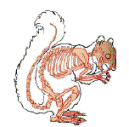
Rita Hayworth as Elsa Bannister in The Lady from Shanghai (dir. Orson Welles, 1947).

Glenn Anders as George Grisby: "I don't want to be within a thousand miles of that city, or any other city for that matter, when they start dropping those bombs."

Orson Welles as Mike O'Hara.

Everett Sloane as Arthur Bannister, under Hayworth's gaze.

Welles and an octopus.
I have wanted to see this movie for years, and somehow never got around to it. It was worth the wait. I know about all the reasons it was such a disappointment to Welles--the scenes that ended up on the cutting room floor, the scenes that didn't, the sappy score--and it is the kind of thing that makes you want to weep. All that footage irremediably lost, the director's total vision consigned forever to the imagination of history. But even so, this mangled compromise may be the most startlingly original film to come out of Hollywood in the forties. Even more than Citizen Kane, The Lady from Shanghai reveals the depths of Welles' eccentric sensibility in both its technical and imaginative aspects (which are often the same thing). The set pieces are justly famous: the aquarium scene, the farcical trial sequence, the Chinese theater, the funhouse mirrors. No one seems to like the opening bit with the carriage ride in the park (Welles himself thought it was too dull and ordinary), but I was hooked from that point on: Welles perched atop the archaic vehicle with his buggy whip, holding forth in his ridiculous "Black Irish" accent, Hayworth ensconced inside, gleaming like a white pearl.
Lots of little moments stay with you: Hayworth swandiving off an ocean cliff within the circular frame of a telescope or singing "Please Don't Kiss Me" (overplayed instrumentally throughout the film) while lying on her back and lazily raising a cigarette to her lips; Glenn Anders, with his bizarre Warner Bros. cartoon voice, chattering about "taaarget practice" and impending atomic war; an archly staged tableau of hoodlums in the park; the constant swirl of slow zooms and canted angles. Everyone, studio and public alike, must have thought Welles was insane. And there is that touch of actual madness to the film, that hysterical clarity of subtle optic distortion you see in El Greco or Diane Arbus.



No comments:
Post a Comment